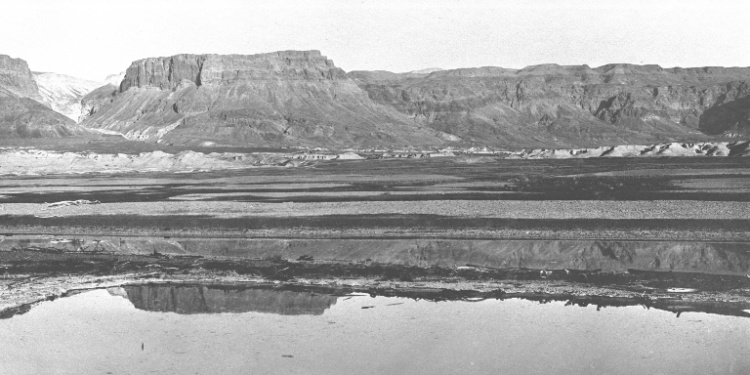Masada: A Historical Epic
Stand for Israel | November 9, 2021

An Israeli poet, translator, editor, and columnist, Yitzhak Lamdan has inspired the Jewish people for nearly a century with his poem, “Masada: A Historical Epic.” And like so many people of the Jewish state – who came to the Jewish state – Lamdan did so because of the anti-Semitism he faced elsewhere. His life led to his words. And his words inspired the Jewish people in their darkest times.
Born to a Jewish family in Ukraine, Lamdan and his brother were uprooted as boys during World War I, wandering southern Russia until being conscripted into the Red Army. After his brother was killed and his family’s home was destroyed, Yitzhak had nothing left. So, like so many Jewish young people between the wars, he made aliyah (immigrated) to the Holy Land during the Third Aliyah in 1920. The above photo of Masada, taken during that period, shows a spot in Israel that inspired the young man.
In Israel, Lamsdan worked as a writer, poet, editor, translator, and columnist. After his death, he was awarded the Israel Prize for literature in 1955. And from the time of his death until the 1980s, the annual Lamdan Prize was given in his memory for literary works for children.
But Lamdan’s greatest work was published in 1927 – the epic poem in Hebrew, “Masada: A Historical Epic.” Lamdan wrote of the Jewish struggle to survive – survival in a world of enemies, which the Jewish people still strive for to this day. Masada stands as a symbol for Israel, the Jewish people’s refuge. Since its writing, the poem has proved quite influential, even inspiring the famous uprising against the Nazis in the Warsaw Ghetto. We’ll leave you with Lamdan’s words to his people, for his people, about his people:
Who are you that come, stepping heavy in silence?
–The remnant.
Alone I remained on the day of great slaughter.
Alone, of father and mother, sisters and brothers.
Saved in an empty cask hid in a courtyard corner.
Huddled, a child in the womb of an anxious mother.
I survived.
Days upon days in fate’s embrace I cried and begged
for mercy:
Thy deed it is, O God, that I remain.
Then answer: Why?
If to bear the shame of man and the world.
To blazon it forever–
Release me! The world unshamed will flaunt this shame
As honor and spotless virtue!
And if to find atonement I survive
Then Answer: Where?
So importuning a silent voice replied:
“In Masada!”
And I obeyed that voice and so I came.
Silent my steps will raise me to the wall,
Silent as all the steps filled with the dread
Of what will come.
Tall, tall is the wall of Masada.
Deep, deep is the pit at its feet.
And if the silent voice deceived me,
From the high wall to the deep pit
I will fling me.
And let there be no sign remaining,
And let no remnant survive.
